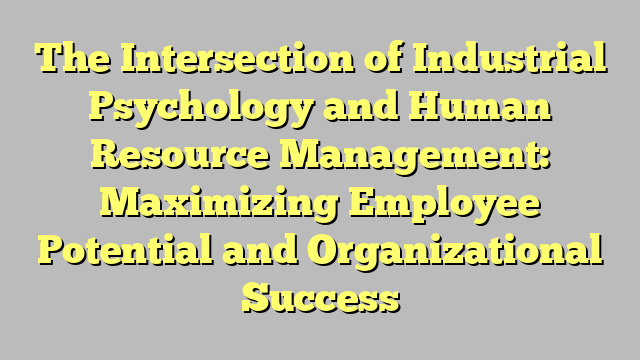The Intersection of Industrial Psychology and Human Resource Management: Maximizing Employee Potential and Organizational Success
The Intersection of Industrial Psychology and Human Resource Management: Maximizing Employee Potential and Organizational Success
Introduction
Industrial psychology and human resource management are two fields that are closely intertwined and have a significant impact on employee potential and organizational success. Industrial psychology focuses on understanding human behavior in the workplace, while human resource management deals with the strategic management of an organization’s workforce. By combining the principles and practices of these two fields, organizations can create a work environment that maximizes employee potential and drives organizational success.
The Role of Industrial Psychology in Human Resource Management
Industrial psychology plays a crucial role in human resource management by providing insights into employee behavior, motivation, and performance. By understanding the psychological factors that influence employee behavior, organizations can design effective recruitment and selection processes, develop training and development programs, and create performance management systems that align with employee needs and aspirations.
Industrial psychologists use various research methods and techniques to study employee behavior and attitudes. They conduct surveys, interviews, and observations to gather data on employee satisfaction, engagement, and motivation. This data is then analyzed to identify patterns and trends that can inform human resource management practices.
Recruitment and Selection
One area where industrial psychology greatly influences human resource management is in the recruitment and selection process. Industrial psychologists help organizations identify the key competencies and skills required for a particular job role and develop selection tools and techniques that accurately assess these attributes.
By using scientifically validated selection methods, organizations can make informed decisions about hiring the right candidates who have the potential to succeed in the role. This not only improves the quality of the workforce but also reduces turnover and enhances organizational performance.
Training and Development
Industrial psychology also plays a vital role in designing effective training and development programs. By understanding the learning styles and preferences of employees, industrial psychologists can develop training programs that cater to individual needs and maximize learning outcomes.
Furthermore, industrial psychologists can assess the effectiveness of training programs by measuring changes in employee knowledge, skills, and attitudes. This evaluation helps organizations identify areas for improvement and make necessary adjustments to enhance the impact of training initiatives.
Performance Management
Performance management is another area where industrial psychology and human resource management intersect. Industrial psychologists help organizations design performance appraisal systems that are fair, objective, and aligned with organizational goals.
By using scientifically validated performance measures and assessment tools, organizations can provide employees with constructive feedback and identify areas for improvement. This not only enhances individual performance but also contributes to overall organizational success.
Employee Engagement and Motivation
Industrial psychology also plays a crucial role in understanding employee engagement and motivation. By conducting surveys and assessments, industrial psychologists can identify the factors that drive employee engagement and develop strategies to enhance motivation and job satisfaction.
Organizations can use this knowledge to create a positive work environment that fosters employee engagement and promotes a sense of belonging. This, in turn, leads to higher levels of productivity, creativity, and innovation, ultimately contributing to organizational success.
Conclusion
The intersection of industrial psychology and human resource management is a powerful combination that can maximize employee potential and drive organizational success. By understanding the psychological factors that influence employee behavior, organizations can design effective recruitment and selection processes, develop training and development programs, and create performance management systems that align with employee needs and aspirations.
Furthermore, by focusing on employee engagement and motivation, organizations can create a positive work environment that fosters productivity, creativity, and innovation. Ultimately, the integration of industrial psychology and human resource management can lead to a highly motivated and engaged workforce, resulting in organizational success.

